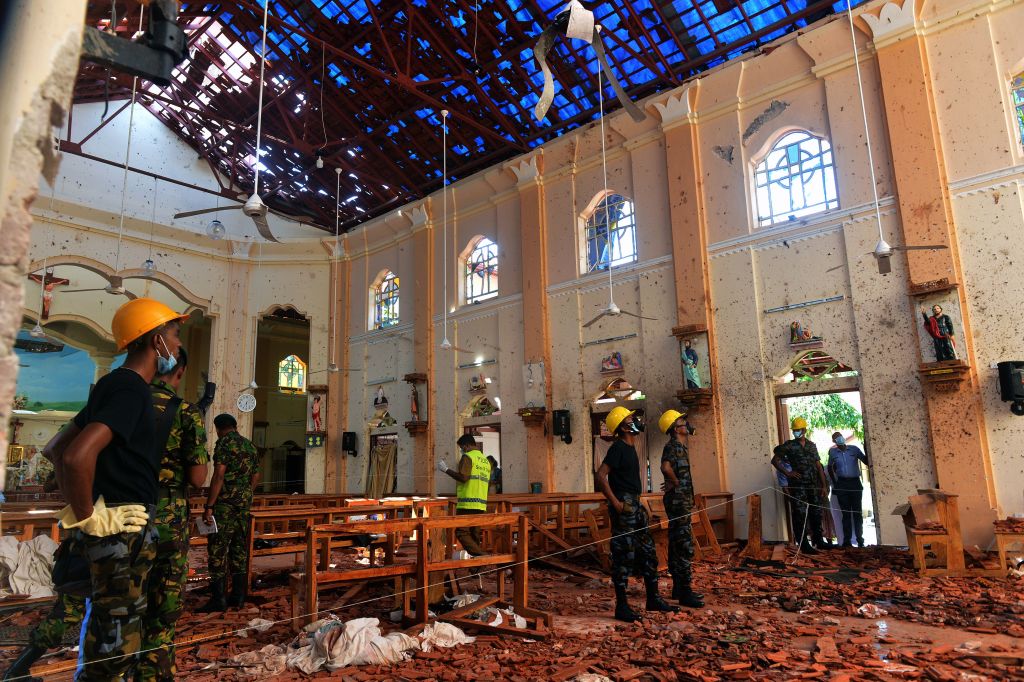Sri Lanka names suspected group behind coordinated deadly Easter bombings, says it had prior warning


A free daily email with the biggest news stories of the day – and the best features from TheWeek.com
You are now subscribed
Your newsletter sign-up was successful
Sri Lanka's government said Monday that a coordinated series of bombings that killed at least 290 people and wounded 500 on Sunday had been carried out by seven suicide bombers from National Thowfeek Jamaath, a little-known Islamist militant group. All the bombers and most of the victims were Sri Lankan, the government said, though authorities are investigating possible foreign links to the attack. At least 24 people were arrested.
The first six bombings hit three Christian churches holding Easter services and three luxury hotels. Among the dead were 32 foreigners from the U.S., Britain, Turkey, India, China, Portugal, and the Netherlands; Danish billionaire Anders Hoch Povlsen said three of his four children died in the attacks.
Sri Lankan Prime Minister Ranil Wickremesinghe confirmed Sunday night that security services had been "aware of information" about a possible attack on churches and had not acted on it. An April 11 domestic intelligence report seen by Reuters said a foreign intelligence service had warned Sri Lanka about possible attacks. Two government ministers also said publicly that there had been warnings, some specific to popular churches.
The Week
Escape your echo chamber. Get the facts behind the news, plus analysis from multiple perspectives.

Sign up for The Week's Free Newsletters
From our morning news briefing to a weekly Good News Newsletter, get the best of The Week delivered directly to your inbox.
From our morning news briefing to a weekly Good News Newsletter, get the best of The Week delivered directly to your inbox.
The Easter bombings were the deadliest incident in Sri Lanka since a 26-year-long civil war ended in 2009 between the country's mostly Buddhist Sinhalese majority and its Tamil minority, made up of Hindus, Christians, and Muslims. "While anti-Muslim bigotry has swept the island in recent years, fed by Buddhist nationalists, the island also has no history of violent Muslim militants," The Associated Press reports. "The country’s small Christian community has seen only scattered incidents of harassment in recent years."
A free daily email with the biggest news stories of the day – and the best features from TheWeek.com
Peter has worked as a news and culture writer and editor at The Week since the site's launch in 2008. He covers politics, world affairs, religion and cultural currents. His journalism career began as a copy editor at a financial newswire and has included editorial positions at The New York Times Magazine, Facts on File, and Oregon State University.
-
 Regent Hong Kong: a tranquil haven with a prime waterfront spot
Regent Hong Kong: a tranquil haven with a prime waterfront spotThe Week Recommends The trendy hotel recently underwent an extensive two-year revamp
-
 The problem with diagnosing profound autism
The problem with diagnosing profound autismThe Explainer Experts are reconsidering the idea of autism as a spectrum, which could impact diagnoses and policy making for the condition
-
 What are the best investments for beginners?
What are the best investments for beginners?The Explainer Stocks and ETFs and bonds, oh my
-
 Nobody seems surprised Wagner's Prigozhin died under suspicious circumstances
Nobody seems surprised Wagner's Prigozhin died under suspicious circumstancesSpeed Read
-
 Western mountain climbers allegedly left Pakistani porter to die on K2
Western mountain climbers allegedly left Pakistani porter to die on K2Speed Read
-
 'Circular saw blades' divide controversial Rio Grande buoys installed by Texas governor
'Circular saw blades' divide controversial Rio Grande buoys installed by Texas governorSpeed Read
-
 Los Angeles city workers stage 1-day walkout over labor conditions
Los Angeles city workers stage 1-day walkout over labor conditionsSpeed Read
-
 Mega Millions jackpot climbs to an estimated $1.55 billion
Mega Millions jackpot climbs to an estimated $1.55 billionSpeed Read
-
 Bangladesh dealing with worst dengue fever outbreak on record
Bangladesh dealing with worst dengue fever outbreak on recordSpeed Read
-
 Glacial outburst flooding in Juneau destroys homes
Glacial outburst flooding in Juneau destroys homesSpeed Read
-
 Scotland seeking 'monster hunters' to search for fabled Loch Ness creature
Scotland seeking 'monster hunters' to search for fabled Loch Ness creatureSpeed Read
